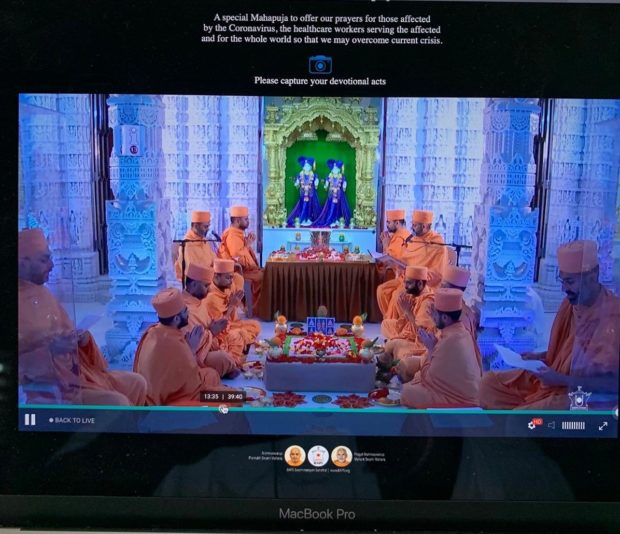“It’s like faith has lost one of its legs”
Meenketan Jha | mj2930@columbia.edu

It wasn’t meant to be like this, Swami Satyanand says.
In fact, since he became the head priest of a Hindu temple in Flushing, Queens 10 years ago, the festival of Chaitra Navaratri was always celebrated with dozens of devotees eating, drinking, praying and singing together. The children would clap along, he remembered, competing with one another to see who could make the loudest noise.
But this year, the festival, which celebrates the Goddess Durga and started on March 25th, was greeted with the soft chants of a handful of priests sitting a safe distance away from one another in the desolate confines of the temple.
Unimaginable, the swami says. With a majority of the world under quarantine and under self-isolation after the outbreak of Covid-19, community locations like mandirs have become ghost towns. Even the Hindu Gods have been forced to bend their backs to this modern-day pandemic. While Christian churches have managed to adapt to this unforeseen series of events by bringing the communion to the homes of the worshippers through technology, small-scale Hindu temples find themselves struggling to cope.
“There hasn’t been one soul permitted within temple compounds in the last two weeks,” says the Swami, who heads the Geeta Mandir at 92-11 Corona Avenue in Flushing. “It’s only been me,” he adds with a little sigh as he ends. Police have been surveilling the mandir from time-to-time, checking to see if it has remained closed. In the times of constant vigilance, these places of worship risk losing its core value of community.
Hindu temples in the United States have become like a weekend destination where parents take their children to for educational activities like shloka and traditional dance or singing classes. In a way, visiting a temple has been bred into the Indian-American lifestyle as a way of life. For young, new generation Indian-Americans, temples are like a telescope providing a glimpse into their heritage and ancestry.
The eeriness within the mandir halls has grown with passing time as self-isolation and quarantining become ever more paramount. The elongated hours of silence, which were previously sporadic, have become a part of everyday routine. The evening aartis are conducted by a solitary priest without the band of devotees singing and clapping along, the energy and vibrancy drained with them.
“It’s like faith has lost one of its legs,” says Satyanand explaining the role of a devotee. “Without people, religion is only texts, stories are just words and fragments. There is no emotion and vigor.”
The onset of the pandemic has put the Geeta Mandir in a troublesome position. With the situation only expected to get worse with proposed plans of an indefinite lockdown in place, the temple is at the risk of using up all of its resources like bhog, the offerings made to the God, often brought by the devotees as a way of saying thanks. Usually, bhog is a mixture of richly curated range of diverse food items, but with the restrictions in place Swami Satyanand says that they are limited to presenting God with rice and dal, or lentil soup.
Despite the challenges that the temple faces, Swami Satyanand says that health and safety of the devotees remain an utmost priority. “Once this passes, we’ll all come back stronger and serve God with a truer devotion than we had been before,” he assures me.
Hinduism in the United States has come a long way. The country is now home to more than 400 Hindu temples and not every temple has been tested like the Geeta Mandir. The BAPS Swaminarayan Sanstha, which has more than 3,800 centers across the world, has taken the aartis to its followers through technology. One of the most influential centers of Hinduism, BAPS provides spiritual nourishment to those who need their faith at this time virtually through venerations that are broadcasted live for other devotees to follow through their website.
“While we can’t recreate the human touch and the personal connections through these virtual sessions, we do try to reduce the physical distance,” says Kashyap Patel, a member of the BAPS community. The organization runs a weekly program for young children, teenagers, college students, and adults.
On this week’s agenda was the topic of positivity. High school students discussed together on how to remain optimistic as these unprecedented times pass us by. The students were asked to always look for the source of light, no matter how small, in the dark.
